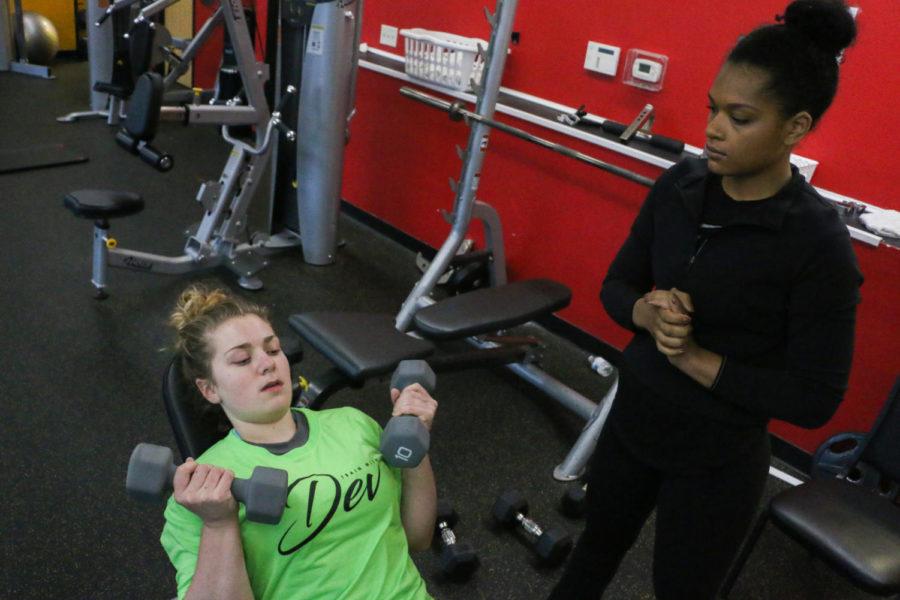Tips to improve fitness and health
Emily Blobaum/Iowa State Daily
Devin Wilmott, personal trainer and 2017 graduate of Iowa State, works with Taylor Schumacher to help rebuild her strength after being diagnosed with postural orthostatic tachycardia syndrome (POTS). Wilmott modifies Schumacher’s exercises to where Schumacher is able to sit or lie down. The two have known each other since high school. “I feel like our relationship has grown a lot, we’re good friends above anything else.”
August 5, 2019
As new diets and fitness plans surface, students are taking the initiative to reform old habits, but finding the time and energy for diet and exercise can be a barrier when striving to start a healthy lifestyle.
Cole Rogers, a freshman in pre-business at Iowa State, says that there are easy ways to start exercising.
“One of the easiest ways to become active if you don’t like exercising would be to join some type of club team to try to walk around campus, because the miles really start to add up,” Rogers said.
Rogers said utilizing the recreational centers and recreational league sports teams are great outlets for fitness. Although Rogers said he does realize that some people may not have the love for exercising as others do, getting together with friends or making new ones can make being active more bearable.
Kate Kokemiller, an Iowa State alumna with a degree in dietetics, said she focuses her time on exploring ways to teach others how to be healthy through a nutritional perspective.
From working as the nutrition coordinator for the Boys and Girls Club to a dietitian’s assistant at Hy-Vee, Kokemiller uses her experiences as a tool to help others find diet easy and fun. Kokemiller said a bad diet can disturb both academic studies and health.
“Our bodies have to take what we eat [by breaking down and digesting or absorbing food] and use that as the energy for the body’s processes and for building materials for new cells within our bodies,” Kokemiller said.
If an individual is fueling their body right, it may prevent the risk of chronic disease and provide the proper nutrition needed to process throughout the day, Kokemiller said. She recommended that students who wish to improve their health should incorporate small lifestyle changes, for example, taking time to eat breakfast and preparing meals for the day.
“Try incorporating foods with protein and fiber to help fill you up and give you the energy for morning classes — for example, eggs with whole wheat toast” Kokemiller said.
Kokemiller said packing snacks for the day and preparing fruits and vegetables can also help combat hunger throughout the day. She also recommended combining new foods with everyday meals, such as adding dressing and toppings to a salad.
“Your food should be enjoyed,” Kokemiller said. “Try combining foods you love with newer, less-familiar foods. Eating shouldn’t feel like a chore, and it shouldn’t be taken for granted or abused either. Think of it as an opportunity to satisfy your appetite and fuel your body with the nutrients it needs.”
Ice cream can be replaced by some sweetened yogurt and chips, and dip can be switched out with red pepper strips or celery with hummus.
Taking the time to eat and understanding hunger cues is important, knowing that good-tasting food with limited nutritional value still does exist, but according to Kokemiller, food should not be a bad experience.
For Caroline Crisp, a sophomore majoring in mechanical engineering, diet means practicing leniency and not restricting yourself from foods.
“Completely restricting yourself of seemingly ‘bad’ foods will get you caught in a constant cycle of endless cravings and ruining your diet that is attempting to incorporate more mindful decisions,” Crisp said.
Nutrition should not be treated as a chore because it can lead to micromanaging the body, said Crisp. She recommended not being too strict on oneself.
“Listen and pay attention to your hunger cues,” Kokemiller said. “If you’re hungry, eat, and if you’re not, then don’t force yourself to eat.”
For campus resources on food, nutrition and health, students can refer to the Iowa State Extension website.
















